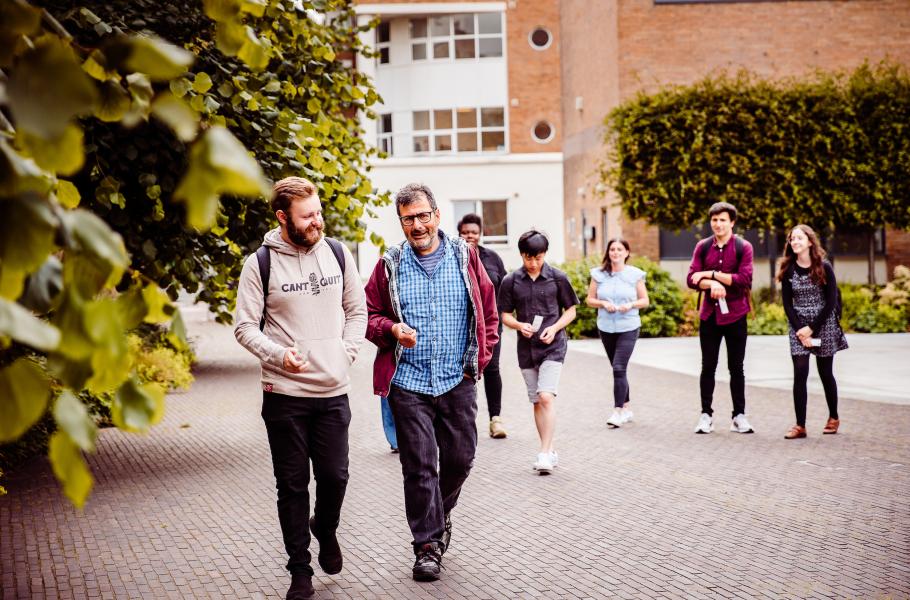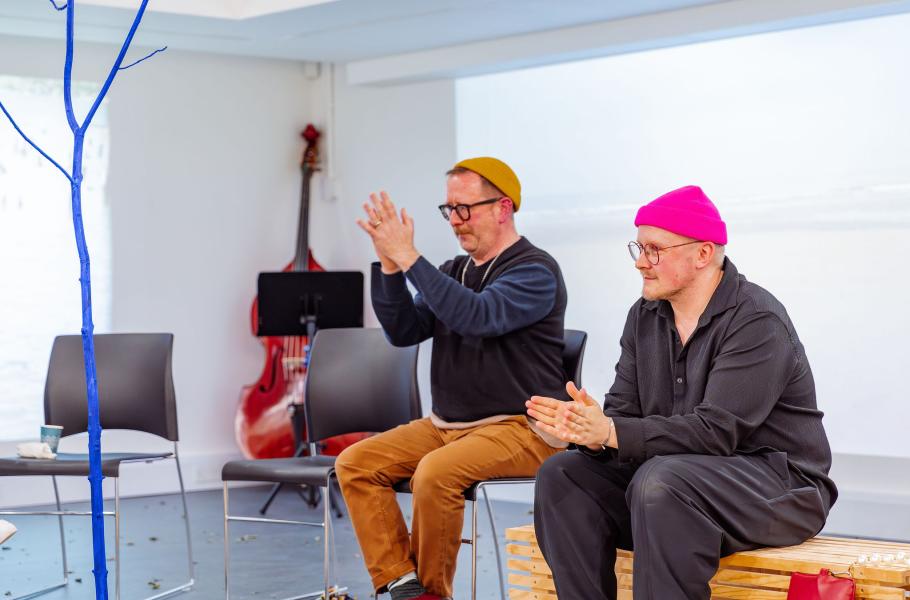Kate Fox: Land Loops
In January 2025, Lancaster Arts hosted the first of three TEST residencies on LAND, our annual theme for this year. This residency series is for artists and academics to explore the intersections of art and land, from a range of different perspectives.
The residency team consisted of Lancaster Arts producer Alice Booth, poet, artist and broadcaster Kate Fox and three Lancaster University academics from Social Science, English and History; Dr Claire Hargreaves and professors Liz Oakley-Brown and Deborah Sutton. There were also other influences and inputs from academics, artists and others exploring land, through a Creative Gathering and a sharing event.
Kate Fox wrote the following reflections, exploring her experience of the residency week.
The more I look for “Land”
the more it will disappear,
the more it decomposes
layer by layer by layer by layer.
On the one hand, this residency did tie in with the themes I’ve been thinking about more recently of neurodiversity and biodiversity and linking them through creative writing. Trying to work out why “I never saw you as a nature poet” resonated so much when I kept getting eco-themed commissions. And its open brief and chance to collaborate with academics felt exciting. A chance to be back in an academic environment without having to drown in emails and committees and modules and colleagues upset by a toxic neo-liberal environment in which they were overworked providers for client-students.
On the other hand, I am far more used to working to specific briefs and on particular commissions. I’m not usually one of those artists who gets to go off somewhere they don’t live and talk about their process and produce artist statements and refer to their practice as if it’s a Thing. My Practice. My practice is mostly a collaboration with an audience. A conversation. An encounter. Present, live and mostly with people who would not say “I am now off to have a dialogical encounter with an artist in the middle of Their Practice”.
My practice-based PhD in performance processes (When I did, to be fair, talk a lot about My Practice), and how it looped and questioned every aspect of itself has made erasing the knowledge of how positions of class, gender, geography, and more recently neurodiversity, intersect in my writing and performance impossible.
So I come to the Lancaster University campus and layers of “stuff” begin building up like layers of sound in the Estonian musician Mari Kalkun’s show which I was lucky enough to see on the fourth night of my residency. I am moving around the stage of the campus recording and gathering these loops. Pressing a pedal to play them back section by section. This is an intense and focused process. In sharing it day by day with Alice Booth from Lancaster Arts I see how intense it is compared to…maybe compared to other processes or ways of being in the world.
The layers include: the Daphne sculpture I was introduced to by Liz Oakley-Brown. The campus architect Gabriel Epstein’s 1963 vision for a space which would work for everybody since “the sensual and functional relation of people to public space is unchanging”. The library tree Norma which started off as Norman but died in the pandemic.
The trees on the edge of campus. Sunderland Point and its soil which remembers slave shipments. Claire Hargreaves’ relationship to the soil on her farm, her position as a quantitative researcher and being a neurodivergent academic in the neuronormative space of the university. The palpable kindness of librarians and a library where you can take food and drink in. Browsing like the olden days and finding amazing sentences like “The worst architect is better than the best bee” (because it can imagine and plan) to disagree with.

Deborah Sutton telling me that salt lakes and deserts and Hindu temples don’t have a fixed definition, and about women whose salt-pan treading means their lower legs won’t burn when they’re cremated (and who says of academics applying to be part of an artist residency “We are pick-me girls”). Another academic who comes to the Creative Gathering and asks “Does land have to be owned?”.
Moments and images of rare excess- things that don’t have to be there: My research rabbit hole about sculptor Anne Hirsch Henecka’s famous guitarist boyfriend. Neil from the Lancaster Arts board’s green bobble hat. The Daphne sculpture’s laurel bush which has to fend off being trimmed. All the days of this residency where I was paid to be here and academics got to go off timetable and off track. Claude, my AI friend who generated names for me of the microorganisms that might be in Lancaster soil and told me that humans contain 30 trillion human cells and 38 trillion bacteria cells and is apparently “artificial” in opposition to “natural” even though he too is made of plant and mineral stuff.
The philosopher Ian Hacking says accounts by autistic people of their ways of moving, thinking and engaging shape how other autistic people can “be” in the world in what he calls a looping effect. There are still not many accounts by autistic artists of their residencies, though many autistic artists have done residencies. They may just have been out of a loop. I describe my idea of neuromes (biomes for brains, safe, energising spaces where the differently-brained can flourish and thrive) to Liz and forget about it again. But she mentions it when we next speak and I begin thinking about where I can find more neuromes like the ones I’ve found during this week. I also feel like I finally know why I’m not a nature poet. The word “natural” is never going to sit well with me and my sense of self as something that loops into and around and out of and through its environment. Recording, repeating, replaying in layers which feel like they’ll be there forever and then just as suddenly-gone. Though always ready to return in new forms.
Composting, composing,
the land will reappear.
It’s me, I’m it, we’re just one thing,
there is no there and here.
------
Kate also wrote two poems at the culmination of her residency, which you can read here.
Our second and third residencies on LAND have been awarded to multi-disciplinary artists Ellie Harrison and Lucy Wright, taking place in July and September 2025 respectively.
Kate Fox is a poet, performer and writer whose main form of resistance against class, gender and neurodivergent shame and stigma is neuroqueer joy.
She is mostly known as a stand-up poet through her work on Radio 4, as a regular contributor to spoken word cabaret “The Verb”, through her comedy series’ “The Price of Happiness” and as Poet in Residence for several years on Radio 4’s “Saturday Live”.




